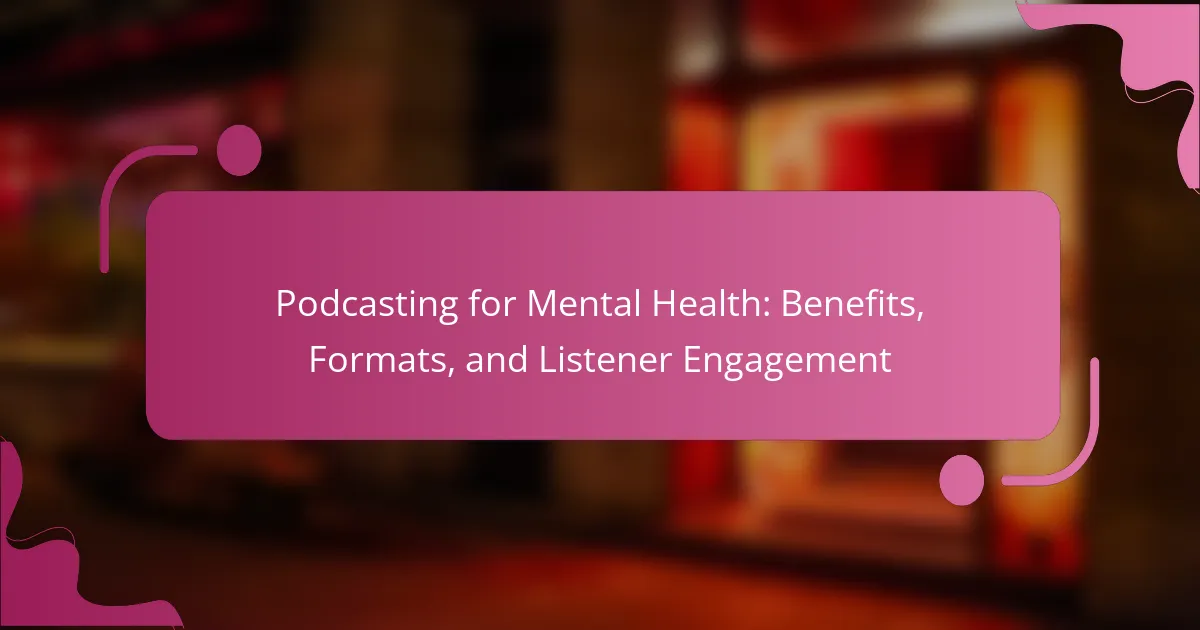Podcasting can significantly improve mental health by enhancing mood, reducing anxiety, and fostering social connections. This article explores effective podcast formats, such as conversational and interview styles, that promote listener engagement. It also discusses strategies for creating interactive content and the importance of addressing stigma and sensitivity in mental health discussions. Key metrics for measuring podcast success will be highlighted to help podcasters gauge their impact.
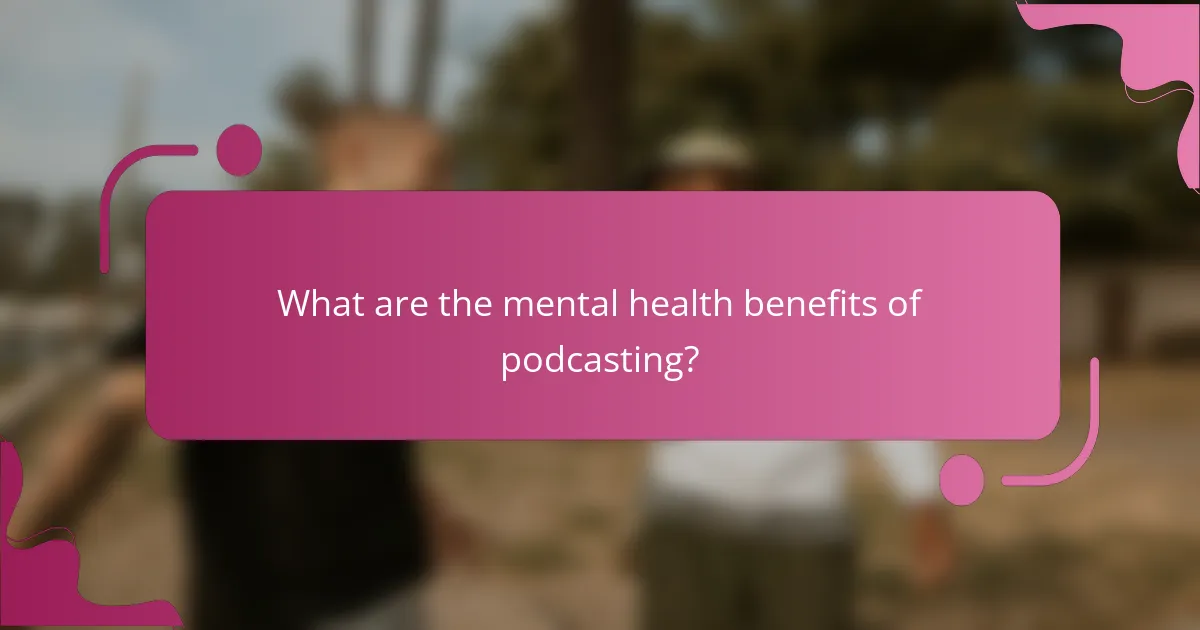
What are the mental health benefits of podcasting?
Podcasting offers significant mental health benefits, including improved mood, reduced anxiety, and enhanced social connection. Engaging with podcast content can provide listeners with a sense of community and support. Additionally, creating podcasts allows individuals to express themselves, fostering creativity and emotional release. Research indicates that storytelling in podcasts can promote empathy and understanding, which are vital for mental well-being.
How does podcasting reduce anxiety and stress?
Podcasting can effectively reduce anxiety and stress by providing an accessible source of comfort and connection. Engaging with podcasts offers listeners a sense of community, distraction from daily worries, and exposure to calming narratives. Research indicates that listening to soothing content can lower cortisol levels, promoting relaxation. Furthermore, various podcast formats, such as guided meditations or storytelling, cater specifically to mental wellness, enhancing their therapeutic effects.
In what ways can podcasts promote emotional well-being?
Podcasts promote emotional well-being by providing relatable content, fostering community, and offering therapeutic insights. They create a safe space for listeners to explore their feelings and experiences. Engaging narratives can reduce feelings of isolation. Listening to expert discussions can provide coping strategies and mental health education.
Why are podcasts effective for therapy and counseling?
Podcasts are effective for therapy and counseling because they provide accessible, engaging content that can enhance mental health awareness and support. They offer a unique platform for sharing personal stories and expert insights, fostering a sense of community among listeners.
Listeners can access therapy-related podcasts anytime, making mental health resources available on demand. This flexibility encourages ongoing engagement, allowing individuals to explore topics at their own pace.
Moreover, podcasts can help normalize conversations around mental health, reducing stigma. By presenting relatable experiences, they empower listeners to seek help and understand their own challenges better.
Additionally, the audio format can create a sense of intimacy, making difficult topics feel more approachable. This personal connection can enhance the therapeutic experience, encouraging deeper reflection and discussion.
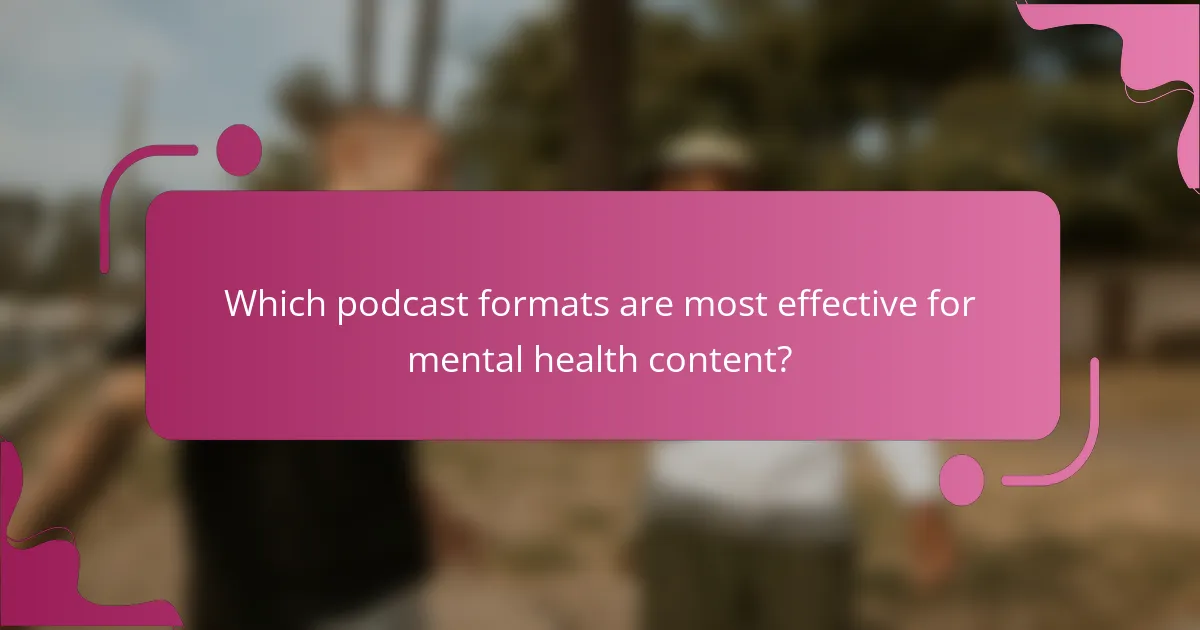
Which podcast formats are most effective for mental health content?
Conversational and interview formats are most effective for mental health podcasts. These formats foster connection and relatability, essential for listener engagement.
1. Conversational format encourages open dialogue, making complex topics approachable.
2. Interview format allows experts to share insights, enhancing credibility and depth.
3. Storytelling format captivates listeners, providing relatable experiences that resonate emotionally.
4. Panel discussions introduce diverse perspectives, enriching the conversation.
These formats can significantly enhance the impact of mental health content, promoting understanding and support.
What are the advantages of interview-style podcasts?
Interview-style podcasts enhance listener engagement by offering authentic conversations and diverse perspectives. They create a sense of connection, making complex topics more relatable. This format often features expert insights, fostering trust and credibility. Additionally, listeners appreciate the storytelling aspect, which can improve retention and understanding of mental health topics.
How do narrative podcasts engage listeners on mental health topics?
Narrative podcasts engage listeners on mental health topics by creating relatable stories that foster connection. These formats often include personal experiences, expert interviews, and emotional storytelling, which enhance listener empathy and understanding. By addressing stigma and providing insights, narrative podcasts become valuable tools for mental health awareness. They encourage open conversations, making mental health topics more accessible and less intimidating for audiences.
What role do solo podcasts play in personal storytelling?
Solo podcasts play a crucial role in personal storytelling by providing an intimate platform for self-expression. They allow individuals to share their experiences, thoughts, and emotions directly with listeners, fostering connection and empathy. This format encourages authenticity, as creators can explore their narratives without external constraints. Additionally, solo podcasts often enhance mental health by offering therapeutic benefits through reflection and communication. Engaging storytelling can resonate with audiences, creating a supportive community around shared experiences.
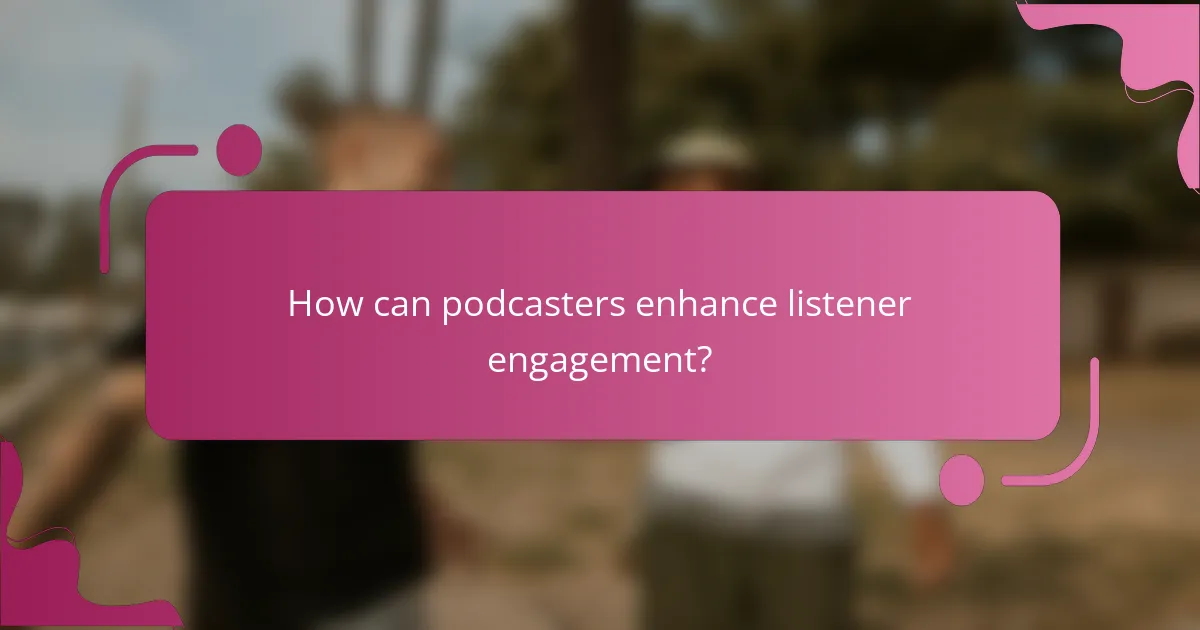
How can podcasters enhance listener engagement?
Podcasters can enhance listener engagement by creating interactive content, fostering community, and utilizing storytelling techniques. Engaging formats like Q&A sessions or live recordings can invite listener participation. Regularly soliciting feedback and incorporating listener suggestions helps build a personal connection. Additionally, sharing mental health resources can deepen the impact of the podcast, making it a valuable tool for listeners.
What strategies can be used to build a community around mental health podcasts?
To build a community around mental health podcasts, focus on engagement, collaboration, and accessibility. Create interactive platforms where listeners can share experiences and insights. Utilize social media to foster discussions and connect with audiences. Collaborate with mental health professionals for credibility and diverse perspectives. Offer resources and actionable advice to empower listeners. Regularly solicit feedback to adapt content to community needs.
How does audience feedback shape podcast content?
Audience feedback significantly shapes podcast content by guiding topic selection, format adjustments, and engagement strategies. This feedback loop ensures that content remains relevant and resonates with listeners.
Podcasters can leverage surveys and social media interactions to gather insights, allowing them to tailor episodes to meet audience preferences. For example, incorporating listener questions or themes can enhance relatability and foster community.
Additionally, analyzing listener metrics, such as episode completion rates, provides data on what content engages audiences most effectively. This data-driven approach can lead to more focused discussions on mental health topics, improving overall listener satisfaction.
Ultimately, audience feedback is crucial for continuous improvement in podcasting, ensuring that mental health content remains impactful and engaging.
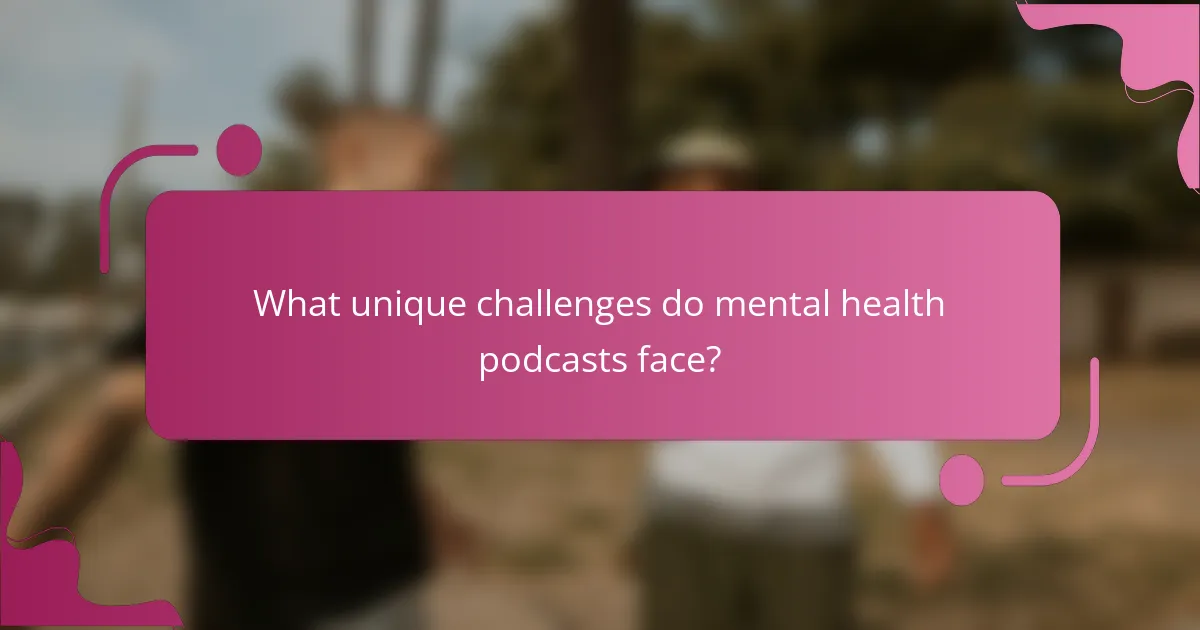
What unique challenges do mental health podcasts face?
Mental health podcasts face challenges like stigma, content sensitivity, and listener engagement. Stigma can deter potential listeners from seeking help. Content sensitivity is crucial; topics must be handled delicately to avoid triggering listeners. Additionally, engaging an audience requires innovative approaches, as mental health discussions can be heavy and complex.
How can podcasters address stigma surrounding mental health?
Podcasters can effectively address stigma surrounding mental health by fostering open discussions and sharing personal stories. They can create safe spaces for dialogue, encouraging listeners to share their experiences. Engaging with mental health professionals as guests can provide expert insights and validate listener concerns. Additionally, using inclusive language and emphasizing the importance of mental health can help normalize conversations. Consistent messaging about the value of seeking help can further reduce stigma and promote understanding within the community.
What are the ethical considerations for discussing sensitive topics?
Ethical considerations for discussing sensitive topics in podcasting include ensuring confidentiality, respecting diverse perspectives, and avoiding stigmatization. Podcasters should prioritize listener safety and provide trigger warnings when necessary. Engaging mental health professionals can enhance credibility and sensitivity. Additionally, fostering an inclusive environment encourages open dialogue and support.
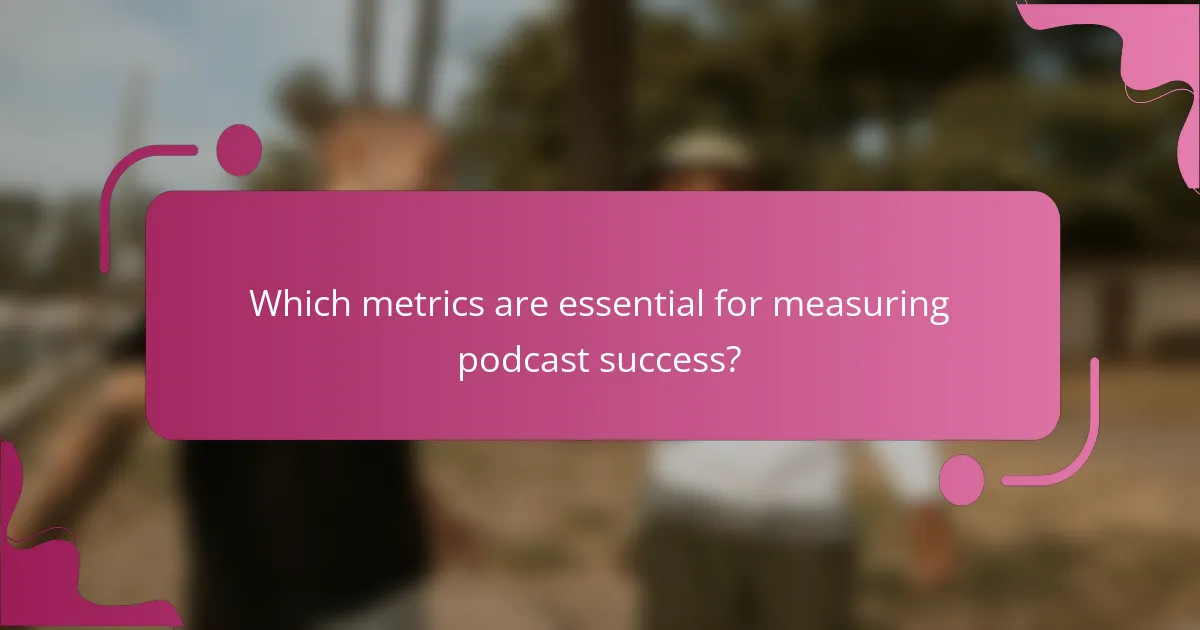
Which metrics are essential for measuring podcast success?
Key metrics for measuring podcast success include listener downloads, audience retention rates, engagement levels, and social media interactions. These metrics provide insights into the effectiveness of content and listener connection.
1. Listener Downloads: Total number of downloads indicates popularity and reach.
2. Audience Retention Rates: Percentage of listeners who stay engaged throughout episodes reflects content quality.
3. Engagement Levels: Listener feedback and interactions show the impact on mental health discussions.
4. Social Media Interactions: Shares and comments indicate community involvement and interest.
5. Subscriber Growth: Tracking new subscribers can highlight growing interest over time.
6. Reviews and Ratings: Listener reviews provide qualitative insights into content effectiveness.
How can listener demographics inform content creation?
Listener demographics significantly shape content creation for podcasts focused on mental health. Understanding age, gender, and interests allows creators to tailor topics and formats. For instance, younger audiences may prefer interactive formats, while older listeners might appreciate in-depth discussions. Engaging with specific demographic data enhances listener connection and retention, fostering a supportive community.
What tools are available for tracking engagement and reach?
Various tools are available for tracking engagement and reach in podcasting. These tools provide insights into listener behavior, episode performance, and audience demographics.
1. Podtrac: Offers analytics on audience size, downloads, and listener demographics.
2. Spotify for Podcasters: Provides data on streams, listener demographics, and engagement metrics.
3. Apple Podcasts Analytics: Tracks performance metrics like listens, average consumption, and listener retention.
4. Google Analytics: Can be integrated to track website traffic related to podcast episodes and listener engagement.
5. Chartable: Offers advanced analytics, including attribution tracking and audience insights.
6. Buzzsprout: Provides stats on downloads, listener locations, and episode performance.
These tools help podcasters optimize content and enhance listener engagement effectively.
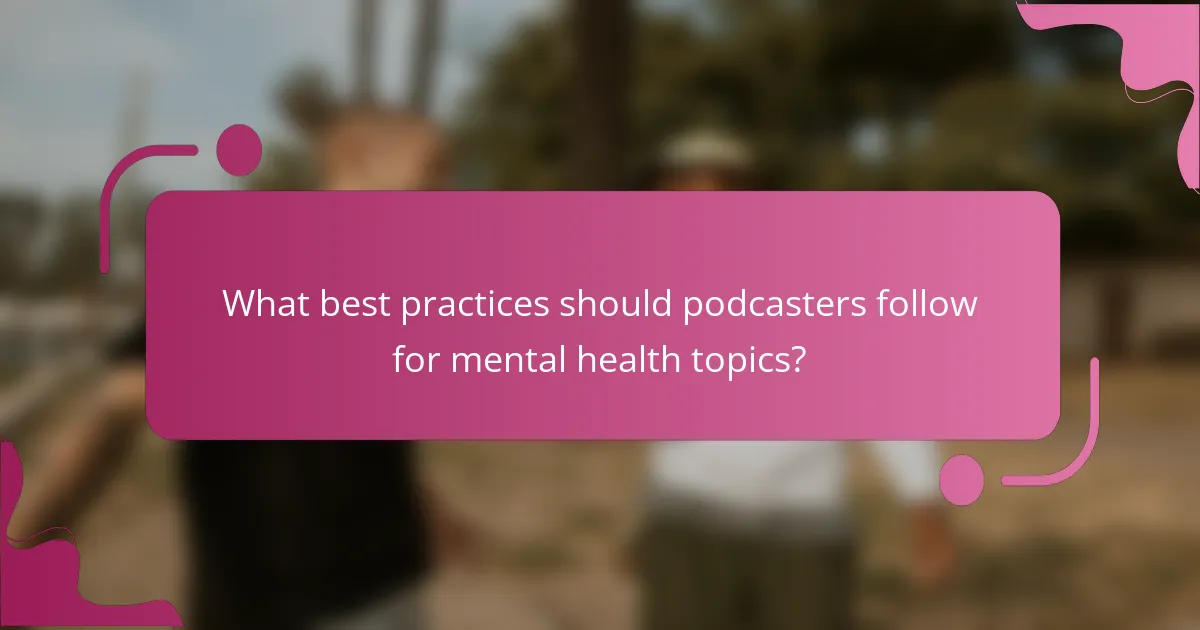
What best practices should podcasters follow for mental health topics?
Podcasters should prioritize authenticity, empathy, and evidence-based content when discussing mental health topics. Engaging listeners through storytelling can enhance relatability and connection. Regularly inviting mental health professionals for expert insights fosters credibility. Additionally, encouraging audience interaction through Q&A sessions promotes community support. Maintaining a safe space for discussion is essential for listener comfort and trust.
How can content creators ensure they provide accurate information?
Content creators can ensure accurate information by conducting thorough research and verifying sources. They should utilize reputable studies, expert interviews, and peer-reviewed articles. Engaging with mental health professionals can enhance credibility, especially in podcasting formats. Regularly updating content based on new findings is crucial for maintaining accuracy.
What common mistakes should be avoided in mental health podcasting?
Common mistakes in mental health podcasting include neglecting audience engagement, failing to provide accurate information, and lacking a clear format. Avoiding these pitfalls enhances listener connection and trust.
1. Ignoring audience feedback can lead to content misalignment.
2. Presenting unverified information risks credibility.
3. Not having a consistent episode structure confuses listeners.
4. Overlooking the importance of mental health sensitivity can alienate the audience.
5. Failing to promote episodes limits reach and engagement.
6. Skipping self-care for hosts can lead to burnout and affect content quality.
What expert tips can enhance the quality of mental health podcasts?
To enhance the quality of mental health podcasts, focus on authenticity, expert insights, and listener interaction. Authenticity fosters trust, while expert insights provide valuable information. Engaging listeners through Q&A segments or feedback encourages community involvement.
